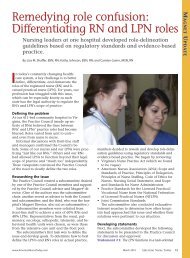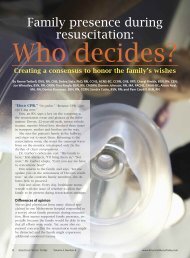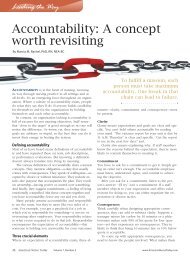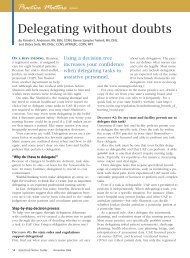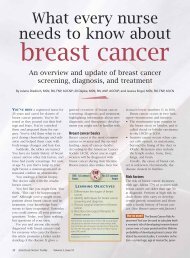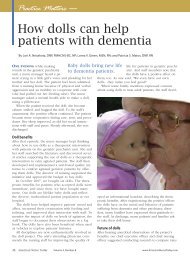2009 MAGNET™ PROFILES - American Nurse Today
2009 MAGNET™ PROFILES - American Nurse Today
2009 MAGNET™ PROFILES - American Nurse Today
Create successful ePaper yourself
Turn your PDF publications into a flip-book with our unique Google optimized e-Paper software.
MAGNET <strong>PROFILES</strong><br />
Nursing research sheds light<br />
on key nursing-care values<br />
To prepare for their hospital’s Magnet redesignation,<br />
nursing leaders formulated a philosophy of patient-care<br />
delivery.<br />
By Lori Neushotz, DNP, PMHCNS-BC, NP, CASAC; Kathleen Parisien, MA, RN; Carol Porter, DNP, MPA, RN;<br />
Pamela Hoar, MSN, RN; Patricia Holloman, BSN, RN, CNOR; and Joyce J. Fitzpatrick, PhD, MBA, RN, FAAN<br />
Having a philosophy of patient-care delivery<br />
gives nurses a framework, values, and beliefs<br />
to guide their professional practice. The philosophy<br />
should directly reflect the relationships<br />
through which care is planned, coordinated, and<br />
delivered. Identifying nurses’ top values is a critical<br />
first step in formulating a philosophy of nursing<br />
practice that has relevance and meaning for all<br />
nursing staff.<br />
As nursing leaders at our hospital prepared for<br />
Magnet redesignation, they were particularly interested<br />
in exploring such a philosophy. Overall<br />
goals were to:<br />
• identify the relevance of the existing philosophy<br />
to nurses, particularly those providing bedside<br />
care<br />
• engage nurses at all levels in developing a new<br />
philosophy of nursing—one that reflects core<br />
values from their perspective.<br />
Before the formal project was implemented, the<br />
chief nursing officer (CNO) asked staff nurses about<br />
their understanding of the existing philosophy of<br />
nursing. The CNO found they had little<br />
awareness of the philosophy and saw it as<br />
only barely related to the care they provided.<br />
work environments. However, while these reports<br />
were relevant to the nursing department’s overall<br />
goals, they weren’t specific to the philosophy of<br />
nursing project, and thus aren’t included in this<br />
report.<br />
Phase 2: Research<br />
In August 2007, the task force designed a formal survey<br />
and distributed it to all registered nurses (RNs)<br />
employed at the hospital. The survey focused on<br />
identifying the values nurses considered most important<br />
to the care they provided. (See Understanding the<br />
study methods.)<br />
Results<br />
Of the 1,800 surveys distributed, 839 responses<br />
were returned, for a response rate of 46.6%. Clinical<br />
nurses accounted for 81% of respondents; nurse<br />
leaders, advance practice nurses, and educators accounted<br />
for 19%.<br />
RNs from all inpatient and ambulatory care ar-<br />
(continued on page 52)<br />
Phase 1: Planning<br />
The formal project had two phases—planning<br />
and research. During early 2007, two<br />
forums were held to generate discussion<br />
about the need for a more clinically relevant<br />
philosophy that was meaningful to direct<br />
patient care. The first discussion occurred<br />
among nursing leaders (directors and nurse<br />
managers) at a regularly scheduled meeting.<br />
Then during <strong>Nurse</strong>s Week, nurses were<br />
asked to list concepts relevant to nursing<br />
care. Next, a task force was appointed to<br />
launch a formal survey among all nurses.<br />
A literature review found that no similar<br />
projects had been conducted. It did find<br />
several papers focused on creating healthy<br />
50 <strong>American</strong> <strong>Nurse</strong> <strong>Today</strong> Volume 4, Number 8




